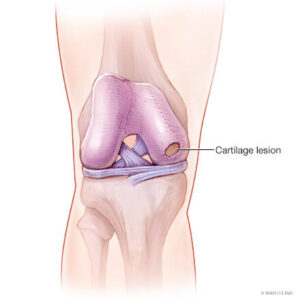Cartilage, the smooth, flexible tissue that cushions our joints, plays a vital role in our overall mobility and comfort. However, a cartilage can lead to pain and decreased joint function. In this article, we will delve into what causes cartilage damage, whether it can be cured, natural remedies for cartilage repair, and the methods used to repair cartilage damage.
What Causes Damage to the Cartilage?
Cartilage injury can result from various factors, including:
- Injuries: Traumatic events, such as sports injuries, falls, or accidents, can harm cartilage. The impact or excessive stress can cause tears or fractures in the cartilage.
- Aging: As we age, cartilage can naturally wear down over time. This process is more common in weight-bearing joints and can lead to conditions like osteoarthritis.
- Repetitive Stress: Certain occupations or activities that involve repetitive joint movements, such as kneeling, may lead to cartilage damage over time.
- Obesity: Excess weight can increase the load on joints, particularly in the knees, which can accelerate cartilage wear and tear.
- Genetics: Some individuals may be genetically predisposed to cartilage-related conditions.
- Infections and Diseases: Infections or diseases affecting joints can injure and damage cartilage. Conditions like rheumatoid arthritis can result in cartilage degradation.
Can Cartilage Damage Be Cured?
Cartilage damage varies in severity, and the potential for a cure depends on factors such as the extent of the damage and the individual’s overall health. In many cases, cartilage damage can be managed effectively with appropriate treatments. While it may not always be completely cured, the following treatments are often employed:
- Physical Therapy: Physical therapists can help improve joint strength and flexibility, reducing the impact of cartilage damage.
- Medications: Anti-inflammatory drugs and pain relievers can manage symptoms associated with cartilage injury.
- Injections: Options like corticosteroid injections or hyaluronic acid injections can provide relief and reduce inflammation.
- Natural Remedies: Some individuals find relief through natural remedies like dietary supplements, such as glucosamine and chondroitin.
- Surgical Interventions: Severe cases may require surgical procedures, including arthroscopy, microfracture, or even joint replacement.
How Can I Repair My Cartilage Naturally?
Promoting natural cartilage repair involves maintaining a healthy lifestyle and addressing factors contributing to cartilage damage. Here are some ways to support natural cartilage repair:
- Maintain a Healthy Diet: Consume a well-balanced diet rich in nutrients like vitamins C and D, which promote collagen production and overall joint health.
- Weight Management: If you’re overweight, losing excess pounds can reduce the stress on your joints and slow down cartilage wear and tear.
- Regular Exercise: Engage in low-impact exercises, such as swimming or cycling, to strengthen supporting muscles and maintain joint mobility.
- Stay Hydrated: Proper hydration is essential for maintaining cartilage health, as cartilage contains water.
- Supplements: Consult with a healthcare provider about dietary supplements like glucosamine and chondroitin, which are believed to support cartilage health.
How Is Cartilage Injury Repaired?
Repairing cartilage damage can involve a variety of medical interventions, depending on the extent of the damage. Some common methods for cartilage repair include:
- Arthroscopy: This minimally invasive procedure involves the use of small incisions and instruments to remove or repair damaged cartilage.
- Microfracture: A surgical technique that involves creating tiny holes in the bone beneath damaged cartilage to stimulate new cartilage growth.
- Autologous Chondrocyte Implantation (ACI): In this procedure, healthy cartilage cells are collected, grown in a lab, and then implanted into the damaged area.
- Osteochondral Allograft Transplantation: This involves the transplantation of cartilage and underlying bone tissue from a donor to repair damaged areas.
- Joint Replacement: In severe cases, joint replacement surgery may be necessary, particularly for large areas of cartilage damage.
In conclusion, understanding the causes and treatment options for cartilage injury is crucial for maintaining joint health and mobility. While complete cure may not always be possible, a combination of medical interventions, lifestyle modifications, and natural remedies can help manage and alleviate symptoms associated with cartilage damage, improving overall quality of life.
Over and above, expert Dr. Rahul Grover can help you detect the signs early and reverse these symptoms for a happy life. Book your appointment today!

